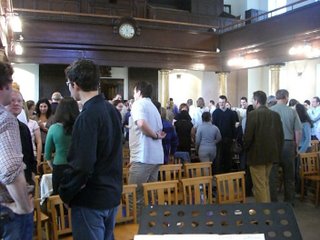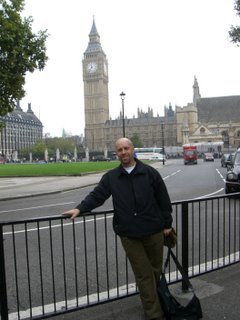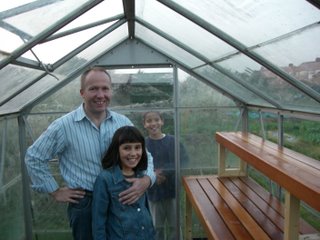Nolan showed me how to do this video embedding thing. I'm just glad my girls are already baptized and unable to get ideas from this:
Tuesday, October 31, 2006
Monday, October 30, 2006
Goodbye, Harry . . .
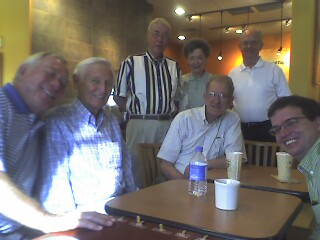 Second from the left (with the light shining on him) is Harry Jones, one of my coffee shop friends. This picture is from the goodbye party they threw for me at Panera. I reported in this blog that Harry told me he had bigger plans than to be around to welcome me back to Johnson City at the end of my time here at Asbury.
Second from the left (with the light shining on him) is Harry Jones, one of my coffee shop friends. This picture is from the goodbye party they threw for me at Panera. I reported in this blog that Harry told me he had bigger plans than to be around to welcome me back to Johnson City at the end of my time here at Asbury.He embarked upon those plans last week. I didn't know Harry for long, the cancer was already hammering away on him when we met. I was drawn to him from the start for two reasons. The first is that he was very gracious toward me. The second is that I'm always impressed by people who die well. It takes great resources to die well. One of the great gifts of God to ministers (I'm not talking about paid/staff ministers, here. This is open to us all.) is the opportunity to be close to people as they die . I suspect that sounds odd, but it's true. In a culture where people tend to die privately we lose something. I want models for dying well.
A faith that doesn't address this is cheapened by the neglect.
I'm reminded of people like Jack Wise, father of Sylvia and Jane-Anne. Jack was a Christian Scientist who refused medicine at the end of his life. The Christian Scientists, despite the criticism they receive, are miles ahead of us on this. They taught him to experience his death. He was present while he died. There is more I would like to say about his death, but (as I have already lamented) we have learned that death is a private affair. I hesitate to say more than that in a forum such as this. I don't want to cheapen something so holy.
Maybe someday I will be able to come up with a list of things to do while we die. The thing is, we have to develop those qualities before the time comes. My friend, Tom Swift, is doing his DMin project on using the Psalms as a devotional guide while dying. The problem he keeps running into is that often, once the news arrives, the person begins to decline too quickly to have the physical ability to do devotionals. I suspect we are already formed by the time the news arrives. I suspect that the key to dying well is living well.
My preliminary, as yet unformed, list of things to do to die well is as follows:
1) Start reading the Psalms now. They need to be in us and at work before the time comes.
2) Be good to people now. Grumpy living leads to grumpy dying.
3) Pray that when the time of testing comes it will be cut short.
4) When the time comes, be open with people who are able to hear what you have to say. I suspect you wouldn't want to cast your pearls before swine, but the people close to you need to be a part of the process.
I've wandered off the topic at hand, which is the death of Harry. Thanks, Harry, for talking to me about your death; for being honest and open about it; for affirming the depth and richness of a faith in Jesus Christ, who rose from the dead so that we who die a death like his might be raised in a resurrection like his.
Until we meet again.
Friday, October 27, 2006
Blog Tag: Book List
I've only just learned that I was "blog-tagged" by Nolan Donald. This means that I'm supposed to answer these questions regarding books. And, just like in most public discussion, we aren't allowed to use the Bible. This restriction is either meant to keep us from being overly pious or to keep us from lying--I'm not sure which.
One book that changed your life:
I've never read a book and then done an immediate 180, however, I'm going to call this one a tie between The Spirit of the Disciplines by Dallas Willard and The Living by Annie Dillard.
One book you've read more than once:
This is easy: The Brothers Karamazov by Fyodor Dostoyevski (who can understand that book the first time through? I wasn't even sure who the lead character was until I figured out the whole diminutive name thing.)
One book you want on a desert island:
I've never read it, but I suspect I would want something like Castaway Survivor's Guide by Cory Storm. One book that made you laugh:
One book that made you laugh:
I can't remember the authors' names, but it was called That's Incurable! It had chapters such as, "Ten Diseases You Would Be Better Off Not Knowing About".
One book that made you cry:
I presume my checkbook doesn't count, so the saddest, most touching, book I've ever read was The Diary of a Country Priest by Georges Bernanos.
One book you wish had been written:
So Your Church Has Decided to Build -or- Double the Estimates: A Guide to Listening to Architects.
One book you wish had never been written:
The Prayer of Jabez by Bruce Wilkenson
One book you're reading right now:
I think I'll start reading The Way of the Lord: Christian Pilgrimage Today by Tom Wright.
One book you've been meaning to read:
The Lord of the Rings series by JRR Tolkien. Kevin Harkey tells me that they are the most important books of the 20th century and all of my preacher friends have read them. I've got to get past my fear of fantasy books.
Tag Five Others: (Abby and Eli, you'll have to tell your dad about this, he won't find out unless you do!) Gary Hook, Amber Lee Peace, Travis Muse, Trav Wilson, Herbie Miller
One book that changed your life:
I've never read a book and then done an immediate 180, however, I'm going to call this one a tie between The Spirit of the Disciplines by Dallas Willard and The Living by Annie Dillard.
One book you've read more than once:
This is easy: The Brothers Karamazov by Fyodor Dostoyevski (who can understand that book the first time through? I wasn't even sure who the lead character was until I figured out the whole diminutive name thing.)
One book you want on a desert island:
I've never read it, but I suspect I would want something like Castaway Survivor's Guide by Cory Storm.
 One book that made you laugh:
One book that made you laugh:I can't remember the authors' names, but it was called That's Incurable! It had chapters such as, "Ten Diseases You Would Be Better Off Not Knowing About".
One book that made you cry:
I presume my checkbook doesn't count, so the saddest, most touching, book I've ever read was The Diary of a Country Priest by Georges Bernanos.
One book you wish had been written:
So Your Church Has Decided to Build -or- Double the Estimates: A Guide to Listening to Architects.
One book you wish had never been written:
The Prayer of Jabez by Bruce Wilkenson
One book you're reading right now:
I think I'll start reading The Way of the Lord: Christian Pilgrimage Today by Tom Wright.
One book you've been meaning to read:
The Lord of the Rings series by JRR Tolkien. Kevin Harkey tells me that they are the most important books of the 20th century and all of my preacher friends have read them. I've got to get past my fear of fantasy books.
Tag Five Others: (Abby and Eli, you'll have to tell your dad about this, he won't find out unless you do!) Gary Hook, Amber Lee Peace, Travis Muse, Trav Wilson, Herbie Miller
Thursday, October 26, 2006
Interim President Kalas
This past week Dr. Kalas spoke in chapel. It was his first chapel since being named interim president of Asbury. It may or may not be interesting for you to listen to this. I have great respect for him as he steps into a difficult situation.
I don't know how long this link will work, but if you would like to watch/download Dr. Kalas' first chapel, just click here.
I don't know how long this link will work, but if you would like to watch/download Dr. Kalas' first chapel, just click here.
London Report Number 6: The Cabinet War Rooms
Okay, I know I said that I was done with my reports on London, but I forgot to report that I went to the Cabinet War Rooms and Winston Churchill Museum on my free day.
Like most museums, the biggest problem is that there is so much to see and so little time.
Some museums are really neat . . . this one goes beyond "really neat" because you are actually standing in the rooms where Churchill directed the war effort against the Nazis.
Beneath the streets of London (and very near Parliament, Big Ben, and Westminster Abbey) you find yourself realizing just how close we came to losing the war. As one who didn't come along until 20 years after the war, I grew up with the unexamined assumption that, a) good always defeats evil, b) the US and Britain always defeat Germany. I suspect that sounds silly. Be gracious, dear reader. We all believe things that we should think very much more about!
 This is the Trans-Atlantic phone room where Churchill could talk to Truman anytime he wanted. Interestingly, most of the people who worked there had no idea this room existed. It was marked as a bathroom and the sign always read "Occupied." Most workers assumed, because it was so close to Churchill's room, that it was Churchill's personal water closet.
This is the Trans-Atlantic phone room where Churchill could talk to Truman anytime he wanted. Interestingly, most of the people who worked there had no idea this room existed. It was marked as a bathroom and the sign always read "Occupied." Most workers assumed, because it was so close to Churchill's room, that it was Churchill's personal water closet.
Fortunately, as you can see from my picture, a Churchill impersonater was ordering a pizza just as I was passing through. What timing!
 This is the cabinet room where all the leaders gathered to discuss strategy and plan the war effort. Churchill was famous for acting more deaf than normal when someone would say something he didn't want to hear.
This is the cabinet room where all the leaders gathered to discuss strategy and plan the war effort. Churchill was famous for acting more deaf than normal when someone would say something he didn't want to hear.
Like most museums, the biggest problem is that there is so much to see and so little time.
Some museums are really neat . . . this one goes beyond "really neat" because you are actually standing in the rooms where Churchill directed the war effort against the Nazis.
Beneath the streets of London (and very near Parliament, Big Ben, and Westminster Abbey) you find yourself realizing just how close we came to losing the war. As one who didn't come along until 20 years after the war, I grew up with the unexamined assumption that, a) good always defeats evil, b) the US and Britain always defeat Germany. I suspect that sounds silly. Be gracious, dear reader. We all believe things that we should think very much more about!
If you would like a virtual tour it will save you the expense of traveling to London, simply click here: Bulldog. This is the map room.
This is the map room.
 This is the map room.
This is the map room. This is the Trans-Atlantic phone room where Churchill could talk to Truman anytime he wanted. Interestingly, most of the people who worked there had no idea this room existed. It was marked as a bathroom and the sign always read "Occupied." Most workers assumed, because it was so close to Churchill's room, that it was Churchill's personal water closet.
This is the Trans-Atlantic phone room where Churchill could talk to Truman anytime he wanted. Interestingly, most of the people who worked there had no idea this room existed. It was marked as a bathroom and the sign always read "Occupied." Most workers assumed, because it was so close to Churchill's room, that it was Churchill's personal water closet.Fortunately, as you can see from my picture, a Churchill impersonater was ordering a pizza just as I was passing through. What timing!
 This is the cabinet room where all the leaders gathered to discuss strategy and plan the war effort. Churchill was famous for acting more deaf than normal when someone would say something he didn't want to hear.
This is the cabinet room where all the leaders gathered to discuss strategy and plan the war effort. Churchill was famous for acting more deaf than normal when someone would say something he didn't want to hear.I highly recommend a visit to this museum. It's a bit pricey (11 pounds), but if you bring your student ID it's only 8.50 pounds--that's a saving of about 5 dollars.
One is also struck by how far technology has come since World War II. The underground bunker was sufficient for the day but would be useless today. Back then a couple feet of concrete would protect you from the world's most dangerous army. Now it's only useful as a museum, a reminder of a day gone by.
It made me reflective about the joys and drawbacks of technology. IPods are great . . . ABombs are not. MRIs have the power to help doctors heal. The threat of WMDs are enough to bring armies to the Middle East. More and more our society looks to science and technology for some sort of salvation from evil. The next time someone tells you that science is making everything better, just remember that it takes as much from us as it gives. In trying to create a heaven on earth science brought us the ability to vaporize entire cities in a single flash--which sounds rather more like hell than heaven.
Technology and science? We need always remember that if lean on that reed it will pierce our hands.
Okay . . . I guess I've wandered off topic. Peace.
One is also struck by how far technology has come since World War II. The underground bunker was sufficient for the day but would be useless today. Back then a couple feet of concrete would protect you from the world's most dangerous army. Now it's only useful as a museum, a reminder of a day gone by.
It made me reflective about the joys and drawbacks of technology. IPods are great . . . ABombs are not. MRIs have the power to help doctors heal. The threat of WMDs are enough to bring armies to the Middle East. More and more our society looks to science and technology for some sort of salvation from evil. The next time someone tells you that science is making everything better, just remember that it takes as much from us as it gives. In trying to create a heaven on earth science brought us the ability to vaporize entire cities in a single flash--which sounds rather more like hell than heaven.
Technology and science? We need always remember that if lean on that reed it will pierce our hands.
Okay . . . I guess I've wandered off topic. Peace.
Wednesday, October 25, 2006
London Report Number 5: The Other Stuff
Okay . . . if you're like me then you're weary of these London reports. I will put this series to bed with this post. You are, of course, free to read, to skim, or to find a more interesting blog. I will understand.
Firstly, some of you have asked if I got to see the grandson of A.E. Whitham. I did not. That's my one disappointment from the trip, but we did get to chat on the phone.
Now for the rest of the things: We began our Oxford visit with a stop at The Eagle and Child, a pub that is famous for being a regular meeting place for the likes of C.S.Lewis and J.R.R. Tolkien.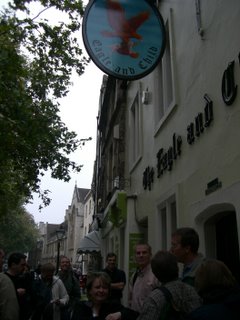 Bryan and I sat (briefly) in the seats that must have been occupied by these two giants at some point (the bottle you see a mango soda of some kind. . .the ethos statement was not broken at the Eagle and Child!).
Bryan and I sat (briefly) in the seats that must have been occupied by these two giants at some point (the bottle you see a mango soda of some kind. . .the ethos statement was not broken at the Eagle and Child!).
 We went on to sample the Oxford community. Below you can see me trying to look deep while walking around Christ's Church College.
We went on to sample the Oxford community. Below you can see me trying to look deep while walking around Christ's Church College.

This is a statue of Fred Norris when he discovered I was going to be the senior minister at Grandview (get well soon, Dr. Norris!).
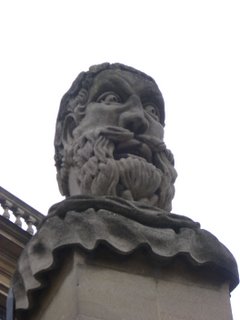 This is the Martyr's Memorial--a monument to the ability of Christians to be brutal to each other. This is very near the spot where Thomas Cramner was burned at the stake.
This is the Martyr's Memorial--a monument to the ability of Christians to be brutal to each other. This is very near the spot where Thomas Cramner was burned at the stake. This is the home where Wesley live toward the end of his life. We were given a nice guided tour from a woman who was reared as a Methodist in England. She knew her subject and was an excellent guide.
This is the home where Wesley live toward the end of his life. We were given a nice guided tour from a woman who was reared as a Methodist in England. She knew her subject and was an excellent guide.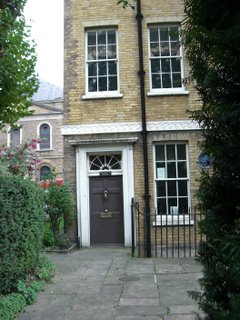 Below is one of the first pulpits Wesley occupied once being asked to quit coming around to Anglican churches. It's in a museum now.
Below is one of the first pulpits Wesley occupied once being asked to quit coming around to Anglican churches. It's in a museum now. This is closet-sized room where Wesley prayed each morning from 4am-8am. This is known as the "powerhouse of Methodism."
This is closet-sized room where Wesley prayed each morning from 4am-8am. This is known as the "powerhouse of Methodism." Below is a picture of Wesley's grave. It is directly behind his house/church. Interestingly, because of the damage after WWII and the scarcity of money, the church had to sell the ground surrounding the back side of the grave to a corporation (can't remember which one). The glass/mirrors you see all around the grave are part of the building that the corporation built on their newly purchased property. . . kind of sad, really.
Below is a picture of Wesley's grave. It is directly behind his house/church. Interestingly, because of the damage after WWII and the scarcity of money, the church had to sell the ground surrounding the back side of the grave to a corporation (can't remember which one). The glass/mirrors you see all around the grave are part of the building that the corporation built on their newly purchased property. . . kind of sad, really. Below you can see Dr. Tory Baucum talking to the group as he stands in front of a statue of Wesley that was erected on the grounds of St. Paul's Cathedral. This surprised me. I knew Wesley was an Anglican priest and intended to stay that way, but I never would have guessed that the Anglican church would take pride Wesley's achievements.
Below you can see Dr. Tory Baucum talking to the group as he stands in front of a statue of Wesley that was erected on the grounds of St. Paul's Cathedral. This surprised me. I knew Wesley was an Anglican priest and intended to stay that way, but I never would have guessed that the Anglican church would take pride Wesley's achievements.
 Here are the Methodists+1 paying homage to Wesley just outside of St. Paul's Cathedral.
Here are the Methodists+1 paying homage to Wesley just outside of St. Paul's Cathedral. We went to a play one night. It was fantastic. The play is called "Wicked." It has only just come to London. We were fortunate that Elphaba (The Wicked Witch) was played by Idina Menzel, who won a Tony for this role on Broadway. She is an amazing singer. For those unfamiliar with the play, it is an explanation of why the Wicked Witch (in the Wizard of Oz) became wicked.
We went to a play one night. It was fantastic. The play is called "Wicked." It has only just come to London. We were fortunate that Elphaba (The Wicked Witch) was played by Idina Menzel, who won a Tony for this role on Broadway. She is an amazing singer. For those unfamiliar with the play, it is an explanation of why the Wicked Witch (in the Wizard of Oz) became wicked.
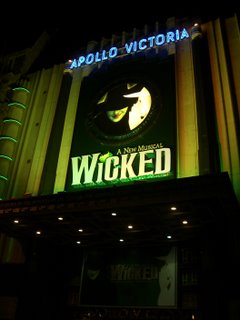 Matt Scholl and I went running on three different mornings while we were in London. The coolest run was on our last morning there. We headed west, planning to run just a couple of miles, but suddenly we looked up to see the Tower Bridge in front of us and we knew that we had to run across it. It was soooo nice. I started the day by running across the Tower Bridge and ended it by hugging my wife and daughters back home in Wilmore.
Matt Scholl and I went running on three different mornings while we were in London. The coolest run was on our last morning there. We headed west, planning to run just a couple of miles, but suddenly we looked up to see the Tower Bridge in front of us and we knew that we had to run across it. It was soooo nice. I started the day by running across the Tower Bridge and ended it by hugging my wife and daughters back home in Wilmore.
Firstly, some of you have asked if I got to see the grandson of A.E. Whitham. I did not. That's my one disappointment from the trip, but we did get to chat on the phone.
Now for the rest of the things: We began our Oxford visit with a stop at The Eagle and Child, a pub that is famous for being a regular meeting place for the likes of C.S.Lewis and J.R.R. Tolkien.
 Bryan and I sat (briefly) in the seats that must have been occupied by these two giants at some point (the bottle you see a mango soda of some kind. . .the ethos statement was not broken at the Eagle and Child!).
Bryan and I sat (briefly) in the seats that must have been occupied by these two giants at some point (the bottle you see a mango soda of some kind. . .the ethos statement was not broken at the Eagle and Child!). We went on to sample the Oxford community. Below you can see me trying to look deep while walking around Christ's Church College.
We went on to sample the Oxford community. Below you can see me trying to look deep while walking around Christ's Church College.
This is a statue of Fred Norris when he discovered I was going to be the senior minister at Grandview (get well soon, Dr. Norris!).
 This is the Martyr's Memorial--a monument to the ability of Christians to be brutal to each other. This is very near the spot where Thomas Cramner was burned at the stake.
This is the Martyr's Memorial--a monument to the ability of Christians to be brutal to each other. This is very near the spot where Thomas Cramner was burned at the stake. This is the home where Wesley live toward the end of his life. We were given a nice guided tour from a woman who was reared as a Methodist in England. She knew her subject and was an excellent guide.
This is the home where Wesley live toward the end of his life. We were given a nice guided tour from a woman who was reared as a Methodist in England. She knew her subject and was an excellent guide. Below is one of the first pulpits Wesley occupied once being asked to quit coming around to Anglican churches. It's in a museum now.
Below is one of the first pulpits Wesley occupied once being asked to quit coming around to Anglican churches. It's in a museum now. This is closet-sized room where Wesley prayed each morning from 4am-8am. This is known as the "powerhouse of Methodism."
This is closet-sized room where Wesley prayed each morning from 4am-8am. This is known as the "powerhouse of Methodism." Below is a picture of Wesley's grave. It is directly behind his house/church. Interestingly, because of the damage after WWII and the scarcity of money, the church had to sell the ground surrounding the back side of the grave to a corporation (can't remember which one). The glass/mirrors you see all around the grave are part of the building that the corporation built on their newly purchased property. . . kind of sad, really.
Below is a picture of Wesley's grave. It is directly behind his house/church. Interestingly, because of the damage after WWII and the scarcity of money, the church had to sell the ground surrounding the back side of the grave to a corporation (can't remember which one). The glass/mirrors you see all around the grave are part of the building that the corporation built on their newly purchased property. . . kind of sad, really. Below you can see Dr. Tory Baucum talking to the group as he stands in front of a statue of Wesley that was erected on the grounds of St. Paul's Cathedral. This surprised me. I knew Wesley was an Anglican priest and intended to stay that way, but I never would have guessed that the Anglican church would take pride Wesley's achievements.
Below you can see Dr. Tory Baucum talking to the group as he stands in front of a statue of Wesley that was erected on the grounds of St. Paul's Cathedral. This surprised me. I knew Wesley was an Anglican priest and intended to stay that way, but I never would have guessed that the Anglican church would take pride Wesley's achievements. Here are the Methodists+1 paying homage to Wesley just outside of St. Paul's Cathedral.
Here are the Methodists+1 paying homage to Wesley just outside of St. Paul's Cathedral. We went to a play one night. It was fantastic. The play is called "Wicked." It has only just come to London. We were fortunate that Elphaba (The Wicked Witch) was played by Idina Menzel, who won a Tony for this role on Broadway. She is an amazing singer. For those unfamiliar with the play, it is an explanation of why the Wicked Witch (in the Wizard of Oz) became wicked.
We went to a play one night. It was fantastic. The play is called "Wicked." It has only just come to London. We were fortunate that Elphaba (The Wicked Witch) was played by Idina Menzel, who won a Tony for this role on Broadway. She is an amazing singer. For those unfamiliar with the play, it is an explanation of why the Wicked Witch (in the Wizard of Oz) became wicked. Matt Scholl and I went running on three different mornings while we were in London. The coolest run was on our last morning there. We headed west, planning to run just a couple of miles, but suddenly we looked up to see the Tower Bridge in front of us and we knew that we had to run across it. It was soooo nice. I started the day by running across the Tower Bridge and ended it by hugging my wife and daughters back home in Wilmore.
Matt Scholl and I went running on three different mornings while we were in London. The coolest run was on our last morning there. We headed west, planning to run just a couple of miles, but suddenly we looked up to see the Tower Bridge in front of us and we knew that we had to run across it. It was soooo nice. I started the day by running across the Tower Bridge and ended it by hugging my wife and daughters back home in Wilmore.
Tuesday, October 24, 2006
London Report Number 4: HTB and the Alpha Course
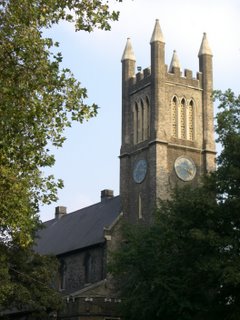 I've brought you back to Holy Trinity Brompton for this entry, which will cover our Monday and then our Wednesday night in London. Holy Trinity Brompton (HTB) is the reason the Beeson Program was willing to pay for us to make the trek to London. HTB's work there is nothing short of miraculous. How many times have you heard that the church in England is dead? Well, reports of its demise have been greatly exaggerated.
I've brought you back to Holy Trinity Brompton for this entry, which will cover our Monday and then our Wednesday night in London. Holy Trinity Brompton (HTB) is the reason the Beeson Program was willing to pay for us to make the trek to London. HTB's work there is nothing short of miraculous. How many times have you heard that the church in England is dead? Well, reports of its demise have been greatly exaggerated.St. Paul's Theological Centre
We spent Monday morning in the HTB crypt listening to a lecture by Graham Tomlin. This lecture is part of a new school begun by HTB to prepare people for the ministry. The need to prepare well-educated leaders without sending them away to theological college (uprooting them from their current areas of service) prompted HTB to begin St. Paul's Theological Centre. This school of theology allows students to remain in London and in their current jobs (often ministry jobs) while they work toward their theological degree.The below pictures give you an idea of the setting. Most of these students became Christians through the Alpha course.
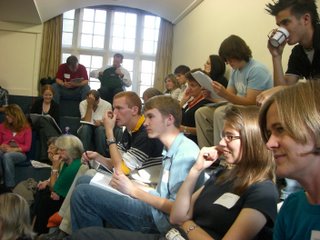
The lecturer for the day was the Rev. Dr. Graham Tomlin who is also a lecturer Oxford. He was knowledgeable and smooth all at once. If you want to know more about him you can read his blog click: here.
In case you are wondering how much validity there is in this new experiment in religious education in London, the faculty even boasts Jane Williams as a lecturer. Her husband is none other than Rowan Williams, Archbishop of Canterbury. I suppose it is safe to assume that it has friends in high places.
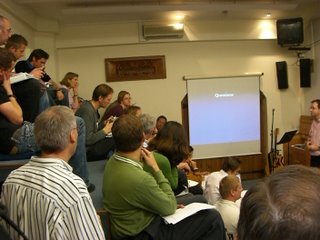
Our Time with Sandy Millar
Wednesday afternoon we got to have some private time with Bishop Sandy Millar. Millar had just returned from Uganda where he was helping train leaders for the Alpha course. He is a man filled with genuine joy. For those around Asbury I would compare his graciousness to that of Dr. Kalas. For those around Grandview I would compare his graciousness to that of Frank Smith. It is such a treat for me whenever I am around ministers who have spent their life in the church and not grown bitter from the experience (there, of course, many who don't come through unscathed).He dismissed the ridicule he originally received for not handling HTB in the traditional British fashion. He praised the loyalty and genius of Nicky Gumbel, for whom he had genuine fatherly and collegiate affection. He was, quite simply, an inspiration.
I appreciate that he is unashamed to pray for healing, even supernatural healing.
Now for the part of the day where I was listening very carefully, mulling the scriptures and the tradition that formed me . . .
. . . in the past, whenever I've been asked about speaking in tongues I've had to say that I know nothing about it (save what scripture says) and that I've never been around it. I could share stories--both good and bad--from other people. That much, at least, changed on Wednesday afternoon.
Millar believes in encouraging the gift of speaking in tongues in private prayer. We gathered in a circle and sang "I love you Lord" and then he encouraged us to sing in tongues. Right now you may be wondering what I was doing.
I was thinking through the scriptures. One thing that amazes me is that a restoration movement that claims to take scripture with the utmost seriousness so easily explains away the gift of tongues. If we read the texts on tongues with the same lens as the texts on baptism, we would be a very different group of people. I understand why we are uncomfortable with it. It can too easily be abused, and (quite frankly) it can too easily be the work of any kind of spirit, not just the Holy Spirit--that much I know from reading the great mystics in church history.
After the time of singing . . . I sang in English . . . we remained in a circle and Millar and others came around the circle and prayed for each of us individually. I very much appreciated their willingness to pray for me and for my ministry. While they prayed I got the sense that I am simply not being called to speak in tongues.
It was a powerful afternoon. I came away amazed at what God has done in one of the most upscale places on earth. Who would have thought that a ministry of primary evangelism, with elements of healing prayer and speaking in tongues, would be thriving just blocks from Harrod's!
I can't help but smile.
 Below is a closer look at Sandy Millar as he greets Jason McIntosh.
Below is a closer look at Sandy Millar as he greets Jason McIntosh. The above events took place on Monday. On Wednesday, our last night in London, we went to
The above events took place on Monday. On Wednesday, our last night in London, we went toThe Alpha Course
HTB for supper and then we stayed around for Nicky Gumbel's presentation in the Alpha Course. I will talk about this course a little bit, but you can look into if further by clicking on the word: Alpha.
Everyone gathers for a meal around 7pm. This room is full of people with little or no connection to the church. They have all been invited by their friends who have already been through the course. My best guess is that there were 500 people there and that the average age was about 27. These were young professionals who had been at work all day, but wouldn't get home until around 10pm that night.
 After the meal the band came out and led the worship time. This worship time was much shorter than the Sunday evening worship and a bit more muted, probably because so many of the ones singing were a little freaked out by the idea of singing to God. This time there was no hand-raising (that I saw) and there were a lot of looks of curious concern on the faces of the various groups.
After the meal the band came out and led the worship time. This worship time was much shorter than the Sunday evening worship and a bit more muted, probably because so many of the ones singing were a little freaked out by the idea of singing to God. This time there was no hand-raising (that I saw) and there were a lot of looks of curious concern on the faces of the various groups. Then Nicky Gumbel preached a short and basic message on who Christ is and why he had to die. There was no flash. There were no bells and whistles. It was all very straight-forward.
Then Nicky Gumbel preached a short and basic message on who Christ is and why he had to die. There was no flash. There were no bells and whistles. It was all very straight-forward.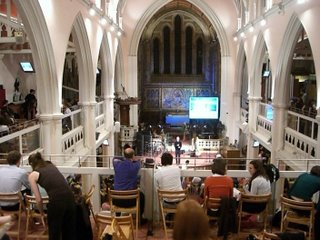 After the teaching time, the people returned to their small groups for discussion on what they had just heard. We didn't witness that because we had to get back to St. Katharine's and prepare to fly out the next day.
After the teaching time, the people returned to their small groups for discussion on what they had just heard. We didn't witness that because we had to get back to St. Katharine's and prepare to fly out the next day.A testimony: I had the opportunity to talk at length with Ben, our van driver, who had come to faith through the Alpha course about 8 years ago. Ben was a drug user and dealer who was invited to come to Alpha by his sister. He said the first night of the course he was on full alert and that he thought it was clever of HTB to use Nicky Gumbel was a smart and likeable presenter (Nicky is the son of a German Jew and a former lawyer). For Ben the pivotal moment came when he realized that Jesus died for him.
"I had always heard that Jesus came to show how to live and all the rest, but I had never heard that he came to die for my sins."
Ben remembers living in a world without hope. There came a point during the Alpha course when he had to ask himself if he really wanted to become a Christian because it would mean that he had to give up dealing drugs. He said he wasn't sure he wanted to do that because dealing was how he made his money. He was obviously very aware of the importance of changing his life. This was no easy commitment.
Like I said, that was 8 years ago. Ben is now on staff of St. Mark's church (a church plant by HTB). His story is just one of many like it. A secular country with antipathy to Christianity is filled with people who have never really heard the message. The Alpha course is doing a great job of presenting it.
Monday, October 23, 2006
London Report Number 3: Three Sunday Worship Services
On our only Sunday in London we went to three separate worship services. The first one turned out not to be the intended target, but it was interesting anyway. Dr. Baucum tried to get us to a church called the Jesus House . . . we wound up here at Glory House instead. This church is home to around 1000 members (hopefully my classmates will correct me if I'm off here). It is largely filled with Nigerian families who are now Londoners.
The building was converted from a commercial building to a church building and the service was the kind one might find on American television. Like Grandview, when the service started the seats were a bit empty . . . but they filled up quickly. The worship leaders began by energetically calling people to get involved. There was a good bit of telling the congregation what kinds of things we ought to be doing ("Touch your neighbor's shoulder and say 'God can do anything.'"). The singing was great. The whole congregation raised their voices, not relying on the great choirs to supply the music.
Like Grandview, when the service started the seats were a bit empty . . . but they filled up quickly. The worship leaders began by energetically calling people to get involved. There was a good bit of telling the congregation what kinds of things we ought to be doing ("Touch your neighbor's shoulder and say 'God can do anything.'"). The singing was great. The whole congregation raised their voices, not relying on the great choirs to supply the music.
There was a heavy emphasis on God's ability to deliver and to make good on promises made--so heavy that it sometimes slipped into the grey area between gospel confidence and the prosperity gospel.
And, in a nice international twist, there was a Swedish Gospel Choir in town. They sang (in English) with the same kind of verve and excitement as the Glory House choir.
 I made a friend. His name is Isaac. He sat on my lap and seemed to enjoy playing with my camera.
I made a friend. His name is Isaac. He sat on my lap and seemed to enjoy playing with my camera. We had to leave before the service was over. The preliminary preacher kept saying he wasn't going to talk for long and that he only had a few minutes to speak before the main preacher. After 35 minutes of telling us that he didn't have much time, we had to leave for the next worship service.
We had to leave before the service was over. The preliminary preacher kept saying he wasn't going to talk for long and that he only had a few minutes to speak before the main preacher. After 35 minutes of telling us that he didn't have much time, we had to leave for the next worship service.
Our next stop was St. Paul's Shadwell. This church is an old London congregation famous as the church home of sailors. It is also where Thomas Jefferson's mother was christened. Despite having THAT going for it, it had fallen on hard times in typical London fashion. The Shadwell area appears to be rebounding, but it is still not one of the nicer areas of London.
New life came to this church, though, when Holy Trinity Brompton (the biggest, most happenin' Anglican church in London--more on that in a second) asked 50 families to relocate from the upscale Westside of London to Shadwell and begin the work afresh at St. Paul's. This was done, by the way, with the blessing of the London Bishop. It's a beautiful old building. Below is a view of the steeple from the Thames, but the real beauty was inside. . .
It's a beautiful old building. Below is a view of the steeple from the Thames, but the real beauty was inside. . .
 . . . where a vital congregation worshipped. The service was very similar to Grandview's 9:30am service, only there isn't a college close by. Though only a few years old, the congregation runs two services (the early one is more formal to meet the desires of the surviving members from before the replant).
. . . where a vital congregation worshipped. The service was very similar to Grandview's 9:30am service, only there isn't a college close by. Though only a few years old, the congregation runs two services (the early one is more formal to meet the desires of the surviving members from before the replant).
We were impressed by the life of a church that has been able to reach people who were not Christians before becoming a part of St. Paul's. These are not people who became Christians at a camp meeting when they were 12 years old.
 After the service at St. Paul's we went to lunch at Spitalfields Market (not the most appetizing name, eh?). It was packed full of people browsing for various ethnic foods (including American style barbecue ribs) and goods.
After the service at St. Paul's we went to lunch at Spitalfields Market (not the most appetizing name, eh?). It was packed full of people browsing for various ethnic foods (including American style barbecue ribs) and goods.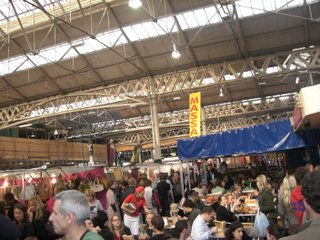 Then we were off to Holy Trinity Brompton, the birthplace of the Alpha Course (more on that in the next blog). Holy Trinity Brompton is in the heart of the Kensington area, just a few blocks from the world-famous store, Harrod's at Knightsbridge. It is a neighbor to the Victoria and Albert Museum and the Natural History Museum. And here, in the heart of upscale London, is a an Anglican church that is going gang-busters.
Then we were off to Holy Trinity Brompton, the birthplace of the Alpha Course (more on that in the next blog). Holy Trinity Brompton is in the heart of the Kensington area, just a few blocks from the world-famous store, Harrod's at Knightsbridge. It is a neighbor to the Victoria and Albert Museum and the Natural History Museum. And here, in the heart of upscale London, is a an Anglican church that is going gang-busters. This church was led for almost 30 years by a man named Sandy Millar, whom we met the following day. Millar is now a Bishop-at-large and the rector of the poorest parish in London. He was heavily impacted by the Vineyard movement in the late-70s. His 20-year assistant, Nicky Gumbel, is the senior minister now.
This church was led for almost 30 years by a man named Sandy Millar, whom we met the following day. Millar is now a Bishop-at-large and the rector of the poorest parish in London. He was heavily impacted by the Vineyard movement in the late-70s. His 20-year assistant, Nicky Gumbel, is the senior minister now.
The church is amazing. The Sunday evening service runs about 600 and the average age looked to be about 24. They have Sunday morning services that skew a bit older and a bit more mellow in worship style. The Sunday evening worship style was, again, similar to Grandview's 9:30am service (the most noticeable differences were less emphasis on Eucharist and a time for people to come forward and be prayed for at the end of the service).
Casual conversations with attendees reveals that there are many people here who didn't grow up in the faith. Many became Christians through the Alpha course. The Alpha course appears to be the best tool of evangelism at the disposal of the church in England. I saw non-conformist churches as well as Anglican churches with banners advertising the program.
What is the Alpha course? Glad you asked. I had to ask as well. It is a 13 week short-course on Christianity. It has, as part of it, a weekend retreat and a weekly meal. The Alpha course at Holy Trinity will be the focus of the next blog. I've got some papers to do and I'm running behind!
The building was converted from a commercial building to a church building and the service was the kind one might find on American television.
 Like Grandview, when the service started the seats were a bit empty . . . but they filled up quickly. The worship leaders began by energetically calling people to get involved. There was a good bit of telling the congregation what kinds of things we ought to be doing ("Touch your neighbor's shoulder and say 'God can do anything.'"). The singing was great. The whole congregation raised their voices, not relying on the great choirs to supply the music.
Like Grandview, when the service started the seats were a bit empty . . . but they filled up quickly. The worship leaders began by energetically calling people to get involved. There was a good bit of telling the congregation what kinds of things we ought to be doing ("Touch your neighbor's shoulder and say 'God can do anything.'"). The singing was great. The whole congregation raised their voices, not relying on the great choirs to supply the music.There was a heavy emphasis on God's ability to deliver and to make good on promises made--so heavy that it sometimes slipped into the grey area between gospel confidence and the prosperity gospel.
And, in a nice international twist, there was a Swedish Gospel Choir in town. They sang (in English) with the same kind of verve and excitement as the Glory House choir.
 I made a friend. His name is Isaac. He sat on my lap and seemed to enjoy playing with my camera.
I made a friend. His name is Isaac. He sat on my lap and seemed to enjoy playing with my camera. We had to leave before the service was over. The preliminary preacher kept saying he wasn't going to talk for long and that he only had a few minutes to speak before the main preacher. After 35 minutes of telling us that he didn't have much time, we had to leave for the next worship service.
We had to leave before the service was over. The preliminary preacher kept saying he wasn't going to talk for long and that he only had a few minutes to speak before the main preacher. After 35 minutes of telling us that he didn't have much time, we had to leave for the next worship service.Our next stop was St. Paul's Shadwell. This church is an old London congregation famous as the church home of sailors. It is also where Thomas Jefferson's mother was christened. Despite having THAT going for it, it had fallen on hard times in typical London fashion. The Shadwell area appears to be rebounding, but it is still not one of the nicer areas of London.
New life came to this church, though, when Holy Trinity Brompton (the biggest, most happenin' Anglican church in London--more on that in a second) asked 50 families to relocate from the upscale Westside of London to Shadwell and begin the work afresh at St. Paul's. This was done, by the way, with the blessing of the London Bishop.
 It's a beautiful old building. Below is a view of the steeple from the Thames, but the real beauty was inside. . .
It's a beautiful old building. Below is a view of the steeple from the Thames, but the real beauty was inside. . . . . . where a vital congregation worshipped. The service was very similar to Grandview's 9:30am service, only there isn't a college close by. Though only a few years old, the congregation runs two services (the early one is more formal to meet the desires of the surviving members from before the replant).
. . . where a vital congregation worshipped. The service was very similar to Grandview's 9:30am service, only there isn't a college close by. Though only a few years old, the congregation runs two services (the early one is more formal to meet the desires of the surviving members from before the replant).We were impressed by the life of a church that has been able to reach people who were not Christians before becoming a part of St. Paul's. These are not people who became Christians at a camp meeting when they were 12 years old.

 After the service at St. Paul's we went to lunch at Spitalfields Market (not the most appetizing name, eh?). It was packed full of people browsing for various ethnic foods (including American style barbecue ribs) and goods.
After the service at St. Paul's we went to lunch at Spitalfields Market (not the most appetizing name, eh?). It was packed full of people browsing for various ethnic foods (including American style barbecue ribs) and goods. Then we were off to Holy Trinity Brompton, the birthplace of the Alpha Course (more on that in the next blog). Holy Trinity Brompton is in the heart of the Kensington area, just a few blocks from the world-famous store, Harrod's at Knightsbridge. It is a neighbor to the Victoria and Albert Museum and the Natural History Museum. And here, in the heart of upscale London, is a an Anglican church that is going gang-busters.
Then we were off to Holy Trinity Brompton, the birthplace of the Alpha Course (more on that in the next blog). Holy Trinity Brompton is in the heart of the Kensington area, just a few blocks from the world-famous store, Harrod's at Knightsbridge. It is a neighbor to the Victoria and Albert Museum and the Natural History Museum. And here, in the heart of upscale London, is a an Anglican church that is going gang-busters. This church was led for almost 30 years by a man named Sandy Millar, whom we met the following day. Millar is now a Bishop-at-large and the rector of the poorest parish in London. He was heavily impacted by the Vineyard movement in the late-70s. His 20-year assistant, Nicky Gumbel, is the senior minister now.
This church was led for almost 30 years by a man named Sandy Millar, whom we met the following day. Millar is now a Bishop-at-large and the rector of the poorest parish in London. He was heavily impacted by the Vineyard movement in the late-70s. His 20-year assistant, Nicky Gumbel, is the senior minister now.The church is amazing. The Sunday evening service runs about 600 and the average age looked to be about 24. They have Sunday morning services that skew a bit older and a bit more mellow in worship style. The Sunday evening worship style was, again, similar to Grandview's 9:30am service (the most noticeable differences were less emphasis on Eucharist and a time for people to come forward and be prayed for at the end of the service).
Casual conversations with attendees reveals that there are many people here who didn't grow up in the faith. Many became Christians through the Alpha course. The Alpha course appears to be the best tool of evangelism at the disposal of the church in England. I saw non-conformist churches as well as Anglican churches with banners advertising the program.
What is the Alpha course? Glad you asked. I had to ask as well. It is a 13 week short-course on Christianity. It has, as part of it, a weekend retreat and a weekly meal. The Alpha course at Holy Trinity will be the focus of the next blog. I've got some papers to do and I'm running behind!
I interrupt the London Reports for . . .
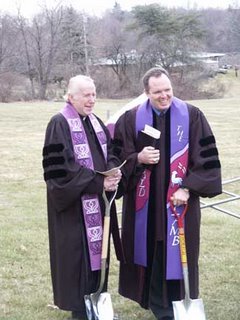
While we were in London the board of Asbury Theological Seminary got together (in the Atlanta airport, I think) to determine the next step in the seminary's future. The news was not good for President Jeff Greenway. He resigned. More than that I cannot say. One hears things about what did and didn't happen and what would and would not be best, but as an outsider I recognize it all as hearsay.
What I can say, without hesitation, is that whatever the reason (or reasons) for the controversy, the board was pretty ham-handed in its execution on this. Nobody looks great in the wake of it.
Dr. Greenway is the man on the right, holding the Bible.
The silver-lining is that Dr. Ellsworth Kalas is the interim president. Those of you who are faithful readers of this blog know that I find Dr. Kalas to be an impressive man. Hopefully he can lead the board and the faculty in a harmonious and helpful direction.
When we heard the news we were still in London and one of our selfish concerns was that Kalas might not have the time to lead our preaching class through to its completion. We met today (I'll blog it later) for preaching and he may have to reschedule some classes, but he can stick it out.
So, the regime change is underway.
Saturday, October 21, 2006
London Report Number 2: The Tourist and the Cousin
Day 2 in London was even better than the first (a week ago today!). Our London talisman, Ben, drove us to Westminster Abbey for a tour. I had been there before, but this time I took advantage of the audio-guide. Many of you have been to Westminster and you know what an amazing collection of history it is.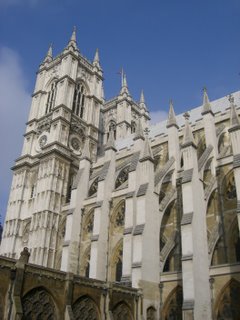 I took this picture from cloisters.
I took this picture from cloisters.
 I took this picture from cloisters.
I took this picture from cloisters.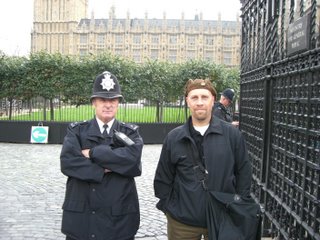 I love this picture. That's the parliament building in the background (I don't know who the statue represents).
I love this picture. That's the parliament building in the background (I don't know who the statue represents). When we left Westminster we went to the British Museum. It has a lot of great stuff, but not much of it is British. The Rosetta Stone is there as well as a great many Egyptian artifacts. I didn't stay long at the museum because it was time to go visit Cindy's cousin and his family just south of London (near Wimbledon).
When we left Westminster we went to the British Museum. It has a lot of great stuff, but not much of it is British. The Rosetta Stone is there as well as a great many Egyptian artifacts. I didn't stay long at the museum because it was time to go visit Cindy's cousin and his family just south of London (near Wimbledon). This is Richard and Lorna Gallagher and their children, Patrick and Maria. We met four or five years ago and somehow (despite the width of the Atlantic Ocean) we have seen each other every year since.
This is Richard and Lorna Gallagher and their children, Patrick and Maria. We met four or five years ago and somehow (despite the width of the Atlantic Ocean) we have seen each other every year since. Richard and the children picked me up at the Tube station and took me straight to their "allotment." The allotment is part of a system of plots for gardening in London. They were a necessity during both World Wars, now they are popular due to the rise in organic gardening.
Richard and the children picked me up at the Tube station and took me straight to their "allotment." The allotment is part of a system of plots for gardening in London. They were a necessity during both World Wars, now they are popular due to the rise in organic gardening. Richard even built a greenhouse to get the seeds started.
Richard even built a greenhouse to get the seeds started. Patrick plays the violin. They both played beautifully and it was great to be in their home for the evening. At about 9:30 pm Richard dropped me back at the Tube Station and I made my way back to East London for the night--the end of a great day.
Patrick plays the violin. They both played beautifully and it was great to be in their home for the evening. At about 9:30 pm Richard dropped me back at the Tube Station and I made my way back to East London for the night--the end of a great day.I always love being with the Gallaghers (pronounced: Galla-her). I wish they lived closer, but it's great that we've been able to see them as much as we have.

Subscribe to:
Comments (Atom)


